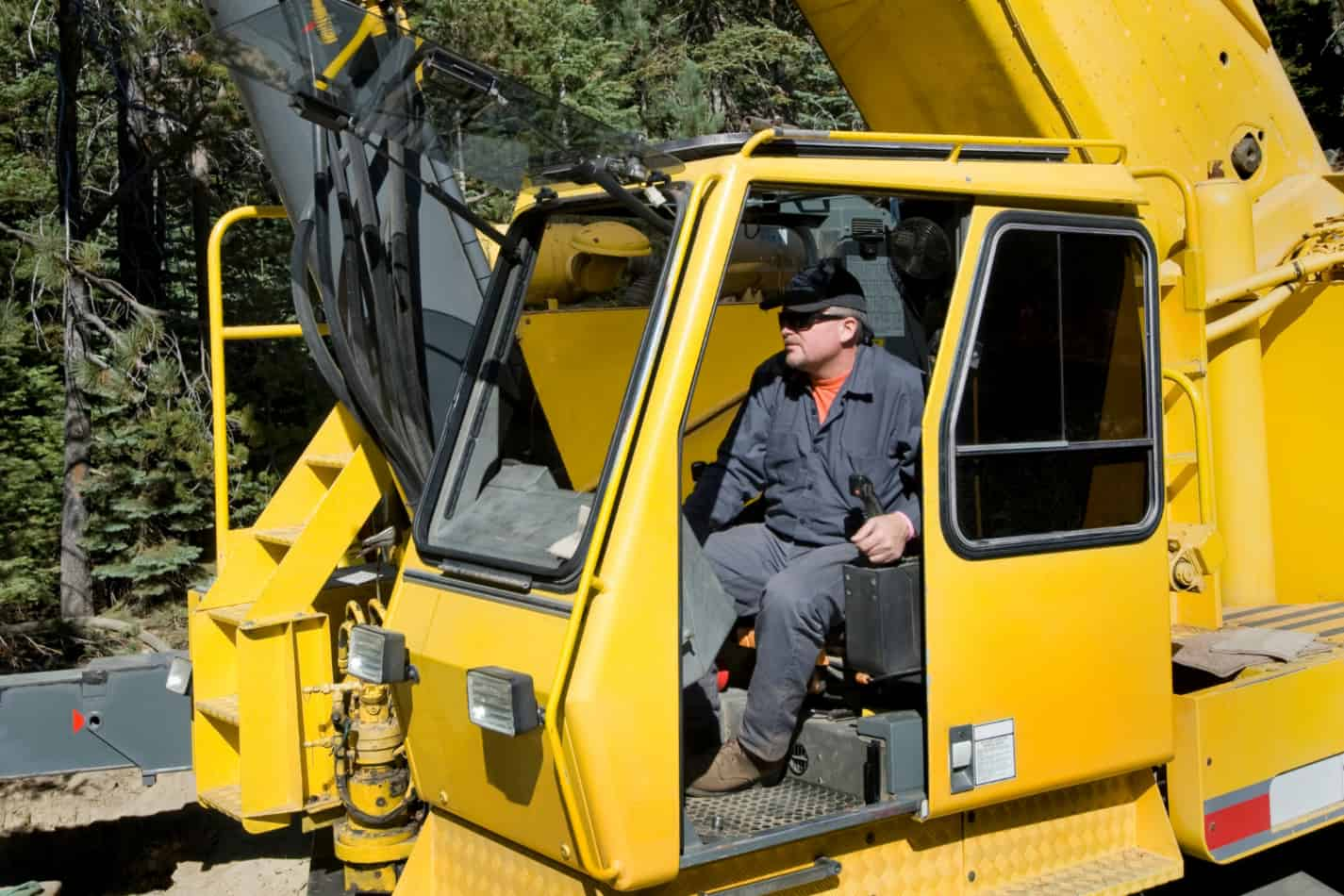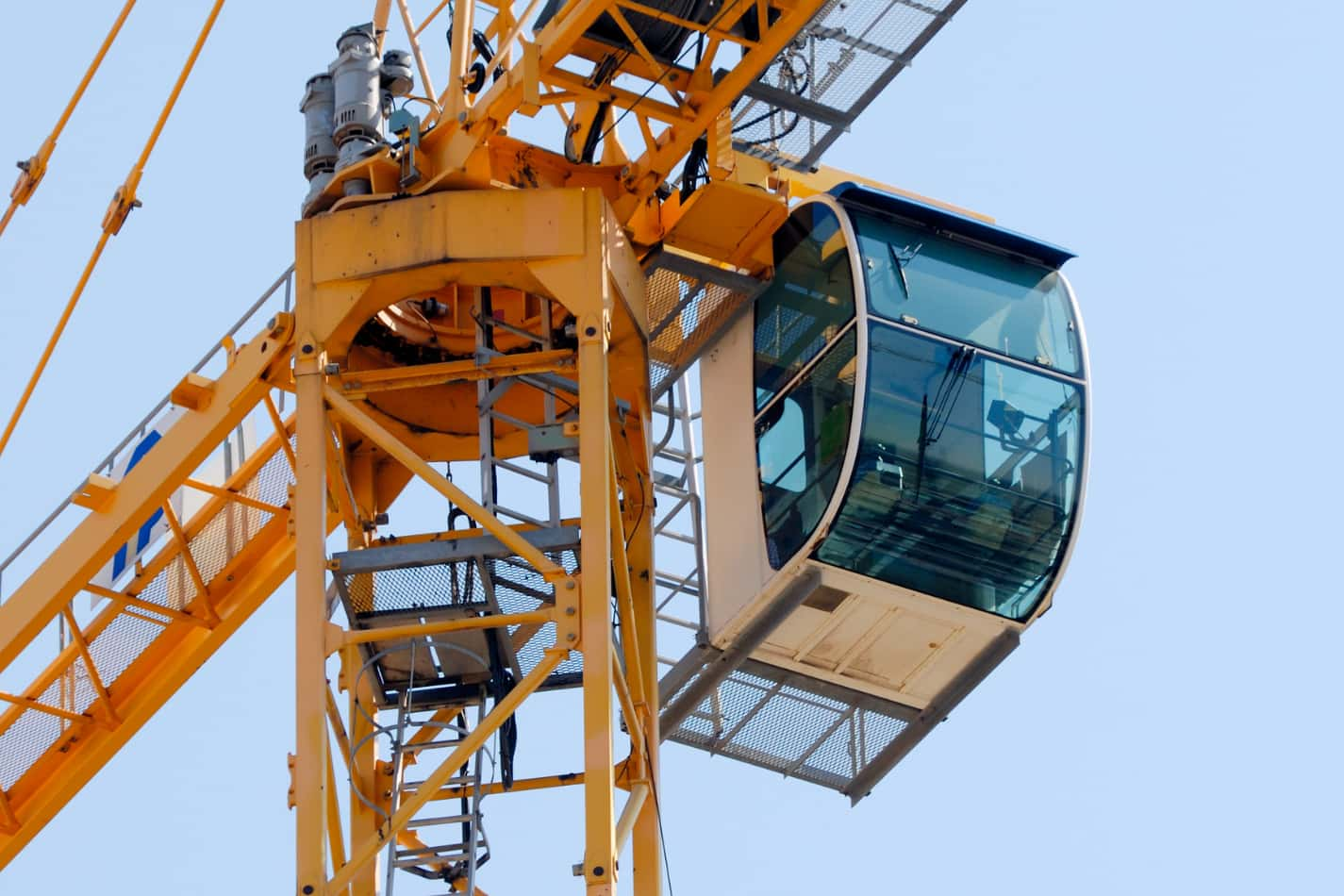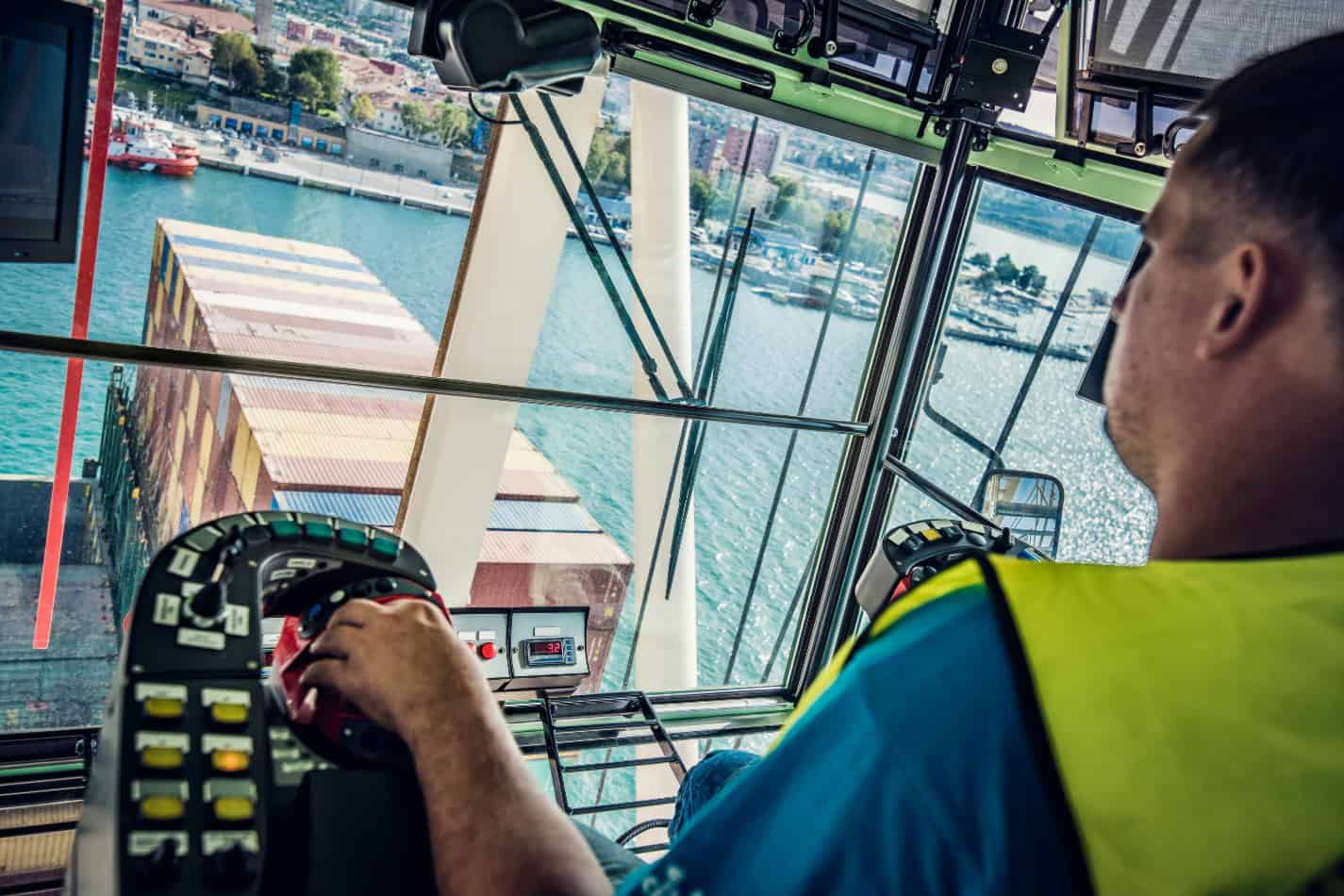Imagine a world without cranes. A world where the only way to build skyscrapers would be with backhoes and dump trucks, or what if you had to transport an entire house by loading it onto the bed of a pickup truck? The crane operator is what makes these feats possible! If you’re interested in what this job entails and how much they make, keep reading!
Crane operators utilize equipment such as buttons, pedals, and levers to operate mobile cranes in order to lift, shift, position, and relocate various goods. The operator controls various crane functions by pushing buttons, foot pedals, and steering cranes levers.
Cranes are used for a variety of purposes, including construction and demolition projects, as well as civil engineering operations. They allow for the large skylines in our larger cities, and without them many of the structures we take for granted would be impossible.
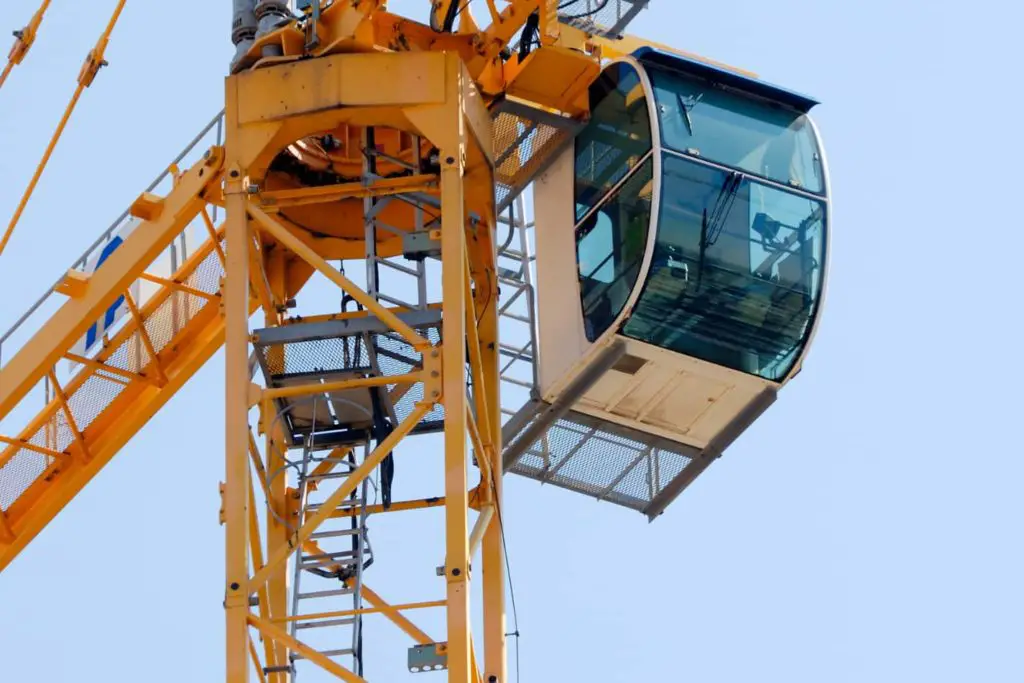
What Does a Crane Operator Do?
The crane operator is an important member of the construction crew, and it is their job to operate a crane in order to move or lift different types of materials. This can include anything from concrete beams for skyscrapers, steel girders used on bridges, machinery for manufacturing facilities – even items as large as ships!
The operator controls what happens by using buttons and levers on the cabin console so they have full control over what direction and what height/depth a load moves at any given time.
The more complex cranes require multiple operators working together so that each person has specific responsibilities related to controlling various functions such as movement speed, hoisting capabilities, etc.
These machines are typically very advanced with countless safety features built-in which ensure no accidents occur while operating them.
Crane Operator Responsibilities
Cranes have more to them than you may have first thought, the crane operator has many tasks and responsibilities they will likely perform in their roles.
These roles include but aren’t limited to:
- Operating the Crane: The most important responsibility of a crane operator is to operate the crane safely and efficiently. This includes moving the crane to the correct spot, setting it up correctly, and ensuring that all loads are handled properly.
- Ensuring Safety: Crane operators must always be aware of their surroundings and what is going on around them. They must also take precautions to ensure the safety of those working near them, as well as the public.
- Loading and Unloading Cargo: This includes making sure that the load is secure before lifting it, and ensuring that it is unloaded in a safe manner.
- Inspecting Cranes: Crane operators are responsible for inspecting their cranes before and after a shift to make sure that they are safe, as well as inspecting the load.
- Maintaining Logs: Crane operators must keep records of what they do on a daily basis in order for managers to assess what is going on with their jobs. They must also report any issues or malfunctions that may occur with cranes.
Expectations of a Crane Operator
There are some expectations from a crane operator that are required in order to ensure the safety of all individuals. These expectations are:
Knowledgeable about Crane Operation: A crane operator must have a complete understanding of how their crane works, as well as the limitations and capabilities of the equipment.
Able to Lift Heavy Loads: Cranes can be quite dangerous if not operated correctly, so it is important that the operators are physically capable of handling the load.
Familiar with Surroundings: The operator needs to be aware of what is going on around them at all times, in order to keep themselves and those around them safe.
Each of these expectations is vital to keeping those working around the crane safe.
What is the Workplace of a Crane Operator Like?
The workplace of a crane operator can vary depending on what type of work they are doing. If they are working in a construction or demolition setting, their work environment may be very noisy and dirty.
If they are working in a more civil engineering setting, their workplace may be more clean and organized.
No matter what the situation, crane operators must always be aware of their surroundings and take all necessary precautions to ensure safety.
How Hard is it to Become a Crane Operator?
If this sounds very interesting to you then you may wonder what it will take to become a crane operator, the good news is that much of it could be done through apprenticeship and not taking out huge college loans!
You need to become a certified mobile crane operator to be eligible to operate a crane in a construction or building site where heavy materials are moved constantly. This can be incredibly rewarding, but hard as it is dangerous overall. It requires a considerable amount of practice and training from professionals.
Later we will cover what it takes for schooling or overall education to become certified and able to perform this function, you can continue to read the responsibilities below or jump to schooling by clicking here.
Crane Operator Duties and Responsibilities
There are a lot of responsibilities that come with the job of a crane operator. Some of these key duties and responsibilities are:
Following Safety Protocol
Safety, when you are lifting incredibly heavy and bulky objects, is extremely important, there are specific safety procedures that must be followed to prevent any accidents or injuries.
Operating the Crane
You must have a complete understanding of how your crane works, as well as the limitations and capabilities of the equipment.
Managing Orders
Understanding and managing your given orders and what the crane is capable of doing will ensure that you get the job done safely, quickly, and effectively.
Performing Maintenance
With all heavy machinery, there is a chance of something going wrong, so it is important to keep up with what maintenance needs to be done on the crane.
Communicating with Team Members
There needs to be solid communication between all members of the team in order to complete the task at hand safely and efficiently.
This is what a crane operator does on a day-to-day basis. By understanding what their responsibilities are, it will be easier to see what is required of them in order to keep everyone safe around them.
Crane Operator Skills and Personality Traits
There are many traits and skills that can help someone in the performance of a crane operator career that we will mention below.
Mechanical Skills
This job requires a lot of mechanical skills, from understanding how the crane works to be able to fix any problems that may arise.
Alertness
Your ability to be alert and aware of what is going on around you will help prevent accidents, as well as keep up with what your job entails.
Ability to Work Independently
While crane operators work closely with their team members in order to complete tasks successfully they also need the ability to work independently when needed.
Attention to Detail
Focus and paying attention to detail are incredibly important when it comes to crane operation, one mistake can be potentially dangerous.
Verbal Communication
Conveying information in a fast and effective manner is crucial when working with a crane.
Being able to read and understand plans is also necessary.
What Is the Cost of Hiring a Bulldozer Operator?
The cost of hiring a bulldozer operator is determined by various factors, including the location, duration, and complexity of the project. Typically, bulldozer work cost includes the operator’s hourly wages, fuel expenses, maintenance, and any additional fees such as transportation. It is essential to obtain quotes from multiple contractors to ensure a competitive price for your specific bulldozer work needs.
How to Become a Crane Operator
If this all sounds interesting to you then you may be wondering what it takes to become a crane operator. The good news is that much of it could be done through apprenticeship and not taking out huge college loans!
The first step to becoming a crane operator is to become a certified mobile crane operator. This can be incredibly rewarding, but hard as it is dangerous overall. It requires a considerable amount of practice and training from professionals.
Note there are some college options for crane operator training, but many employers prefer an apprenticeship.
The Crane Operator Apprenticeship Program usually lasts for four years and can be completed at various locations throughout the United States.
During this time you would be working with a certified crane operator and learn what it takes to safely maneuver these machines.
After completing your apprenticeship, you would then be a certified crane operator.
This is what it takes to become a crane operator, while there are many different paths one can take, the most common and successful route seems to be through an apprenticeship program.
How Much Could You Earn as a Crane Operator?
Overall crane operators are paid what is known as a salary, what this means is that the amount you earn will vary depending on what type of work you do and what company or organization you are working for.
Salary Range
The average crane operator salary ranges from $37,000 to $49,000 per year with most getting paid between $38K and $44K.
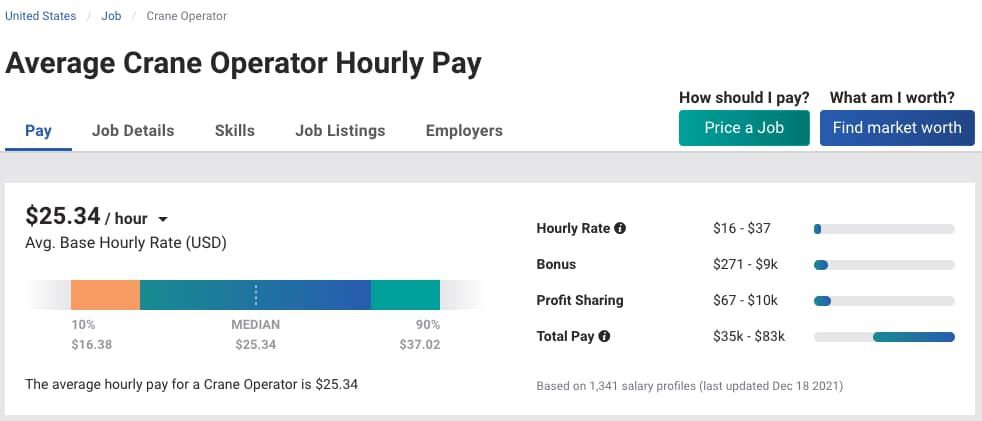
High and Low Ranges
The highest-paid crane operators earn in the range of $56,000 to $70,000 per year while those at the lowest end only make up to about $23K per year on average.
Crane Apprentice
In the United States, the median salary for a Crane Operator Apprentice is $54,513 per year. The typical bonus for a Crane Operator Apprentice is $1,032, which represents 2% of their annual income.
San Francisco has the highest average yearly compensation among Crane Operator Apprentices at $64,422 per worker, with a compensation 18% above the national average.
Final Thoughts on Becoming a Mobile Crane Operator
If you have what it takes to become a crane operator, there are many great benefits that go with this job. You can expect a high salary and the opportunity for plenty of bonuses as well as promotions.
In order to be successful at your work, you will need mechanical skills and attention to detail in addition to being alert and aware of what is going on around you.


